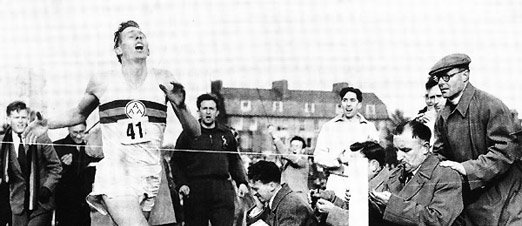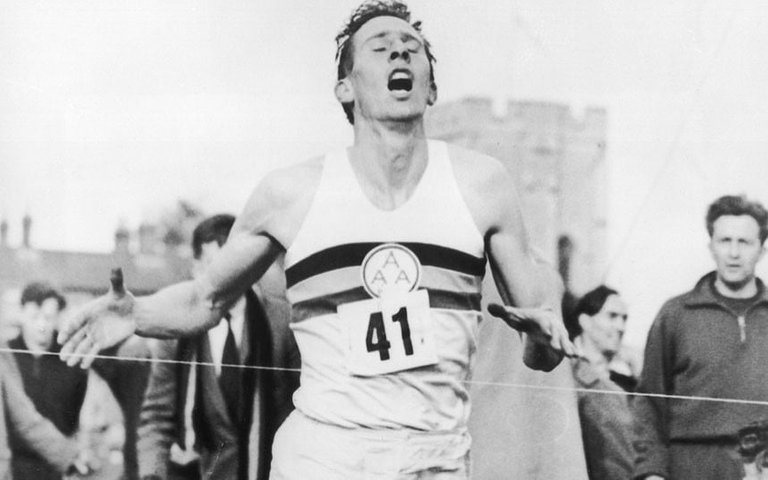The pitiful news of the death of Roger Banister, the main individual to run a four-minute mile, made them consider his heritage—not similarly as one of the immense competitors of the previous century, however as a trailblazer, a change operator, and a symbol of progress. For reasons unknown, when he got through a formerly impervious olympic style events hindrance, he showed every one of us what it takes to break new ground.

Image Source Google ©= Google Image Link
A great many people know the essential story of Roger Banister, who, on May 6, 1954, busted through the four-minute boundary with a period of three minutes, fifty-nine and four-tenths of a moment. However, it was not until the point that I chose to expound on him for my book Practically Radical, and read an exceptional record of his adventures by the British writer and sprinter John Bryant, that I comprehended the story behind the story—and the lessons it holds for pioneers who need to bust through boundaries in their fields. Bryant advises us that sprinters had been pursuing the objective truly since no less than 1886, and that the test included the most splendid mentors and skilled competitors in North America, Europe, and Australia. "For a considerable length of time milers had been endeavoring with time as the opponent, however the slippery four minutes had constantly beaten them," he notes. "It had progressed toward becoming as much a mental hindrance as a physical one. Also, similar to an unconquerable mountain, the nearer it was drawn nearer, the all the more overwhelming it appeared."
This was really the Holy Grail of athletic accomplishment. It's captivating to peruse about the weight, the group, the media whirl as sprinters attempted futile to break the check. Bryant likewise advises us that Banister was an anomaly and maverick—a full-time understudy who had little use for mentors and contrived his own particular framework for planning to race. The British press "continually ran stories condemning his 'solitary wolf' approach," Bryant notes, and encouraged him to embrace a more ordinary regimen of preparing and training.

Image Source Google ©= Google Image Link
So the four-minute hindrance remained for a considerable length of time—and when it fell, the conditions resisted the sure expectations of the best personalities in the game. The specialists trusted they knew the exact conditions under which the stamp would fall. It would need to be in culminate climate—68 degrees and no breeze. On a specific sort of track—hard, dry mud—and before a gigantic, tumultuous group encouraging the sprinter on to his best-ever execution. In any case, Banister did it on a frosty day, on a wet track, at a little meet in Oxford, England, before a horde of only a couple of thousand individuals.
At the point when Banister broke the stamp, even his most passionate adversaries inhaled a murmur of alleviation. Finally, some person did it! Also, once they saw it should be possible, they did it as well. Only 46 days Banister's accomplishment, John Landy, an Australian sprinter, not just broke the boundary once more, with a period of 3 minutes 58 seconds. At that point, only a year later, three sprinters softened the four-minute hindrance up a solitary race. In the course of the last 50 years, in excess of a thousand sprinters have vanquished an obstruction that had once been considered miserably distant.
Indeed, what goes for sprinters goes for pioneers running associations. In business, advance does not move in straight lines. Regardless of whether it's an official, a business person, or a technologist, some trend-setter changes the diversion, and that which was believed to be inaccessible turns into a benchmark, something for others to shoot for. That is Roger Banister's actual inheritance and lesson for every one of us who see the part of authority as doing things that haven't been done previously.
Indeed, two Wharton School teachers have examined the lessons for business of the four-minute mile. In their book, The Power of Impossible Thinking, Yoram Wind and Colin Crook they commit a whole section to an appraisal of Banister's accomplishment, and underscore the mentality behind it as opposed to the physical accomplishment. How is it, they ponder, that such a large number of sprinters crushed the four-minute boundary after Banister turned into the first to do it? "Was there a sudden development spurt in human advancement? Was there a hereditary building test that made another race of super sprinters? No. What changed was the psychological model. The sprinters of the past had been kept down by a mentality that said they couldn't outperform the four-minute mile. At the point when that farthest point was broken, the others saw that they could accomplish something they had already thought unimaginable."
Most reasoning about procedure, rivalry, and authority stresses the complexities of plans of action: incomes, costs, specialties, use. However, mental models are what enable associations and their pioneers to attempt not simply to be the best at what every other person can do, yet to do things that no one but they can do—which, after some time, demonstrates others what it conceivable. They don't acknowledge the impediments, tradeoffs, and widely appealing sensibilities that characterize tried and true way of thinking. At the end of the day, awesome pioneers don't simply out-play out their adversaries. They change the feeling of what's conceivable in their fields.
Congratulations! This post has been upvoted from the communal account, @minnowsupport, by qari from the Minnow Support Project. It's a witness project run by aggroed, ausbitbank, teamsteem, theprophet0, someguy123, neoxian, followbtcnews, and netuoso. The goal is to help Steemit grow by supporting Minnows. Please find us at the Peace, Abundance, and Liberty Network (PALnet) Discord Channel. It's a completely public and open space to all members of the Steemit community who voluntarily choose to be there.
If you would like to delegate to the Minnow Support Project you can do so by clicking on the following links: 50SP, 100SP, 250SP, 500SP, 1000SP, 5000SP.
Be sure to leave at least 50SP undelegated on your account.